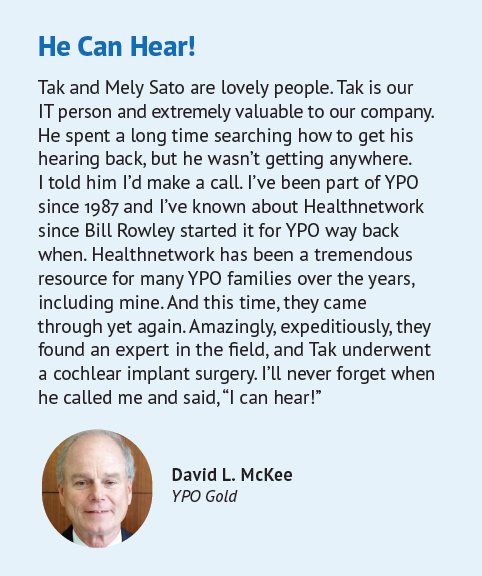Was My Hearing Lost Forever?

The patter of raindrops on the windshield, the rhythmic sound of an office ceiling fan, family voices at the dinner table— the sounds that filled Tak Sato’s daily life disappeared one day. Plunged into silence, Tak found his usual glass-half-full attitude put to the test.
Tak emigrated from Japan in the 80s to study at Cleveland State University. His junior year, doctors discovered an overgrown acoustic neuroma that had wrapped itself around his cerebellum. The tumor was removed, leaving Tak’s face half paralyzed. He permanently lost hearing and sight on the right side and would have to deal with a lack of depth perception for the rest of his life.
“But I adapted and led a pretty normal life for over 30 years,” he says. “Turning lemons into lemonade was the name of my game.”
Then in 2020, Tak abruptly lost hearing in his only functioning ear. Getting an appointment with an Ear, Nose, Throat (ENT) specialist in the midst of Covid-19 protocols was not an easy task. Tak was informed the soonest appointment he could get was a month away. Then his wife got on the phone.
“Thanks to Mely’s tenacity and her gift to open minds, I saw an ENT within 36 hours after onset. That poor scheduler found out what I’ve learned in 28 years of marriage (wink, wink).”
The ENT diagnosed Tak with Sudden Sensorineural Hearing Loss (SSHL) accompanied with vestibular disorder and gave him a series of steroid injections.
When the steroid injections didn’t help, the doctor recommended a cochlear implant (CI). Tak agonized over the decision. He had many questions, the most important one being: Would the CI surgery worsen his vestibular disorder?
Tak started a nonprofit that helps older adults develop “digital literacy,” and the thought of not being able to continue that work was devastating. “I thought I would rather remain deaf than live with constant nausea or being bedridden if that was a high probability.”
Dave McKee connected Tak with Healthnetwork, and we provided two candidates for a second opinion. Tak met with Dr. Alejandro Rivas, Division Chief of Otology and Neurotology at University Hospitals, and felt he could trust him.
“Dr. Rivas is a ‘patient’s doctor,’” says Tak. “He assimilated our concerns as his own, and he applied his expert knowledge and experience to provide options. Most importantly, he provided me with a quantitative risk factor of 10 percent for CI surgery to worsen my vestibular disorder.”
With confidence in Dr. Rivas, Tak decided to go ahead with the CI surgery—which was a success. Today Tak is applying his optimism to his therapy with a team of audiologists, working to retrain his brain to recognize the sounds piped in from the latest CI sound processor on his ear. He sees progress every week.
